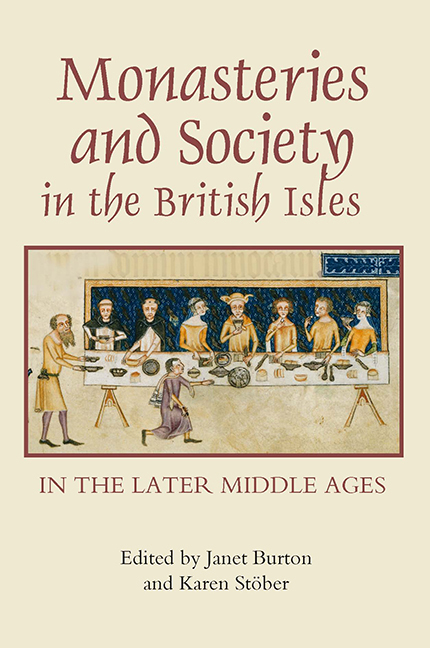Book contents
- Frontmatter
- Contents
- List of illustrations
- Acknowledgements
- List of contributors
- Abbreviations
- Introduction
- The Meeting of the Worlds
- Religious Houses and their Patrons and Benefactors
- Female Communities: Nuns, Abbesses and Prioresses
- Monasteries and Education
- Monasteries and Urban Space
- 12 Early Franciscan legislation and lay society
- 13 The Austin Friars in late medieval Canterbury: Negotiating spaces
- Religious Houses in the Regions
- Index of Religious Houses mentioned in the text
- Index
- Miscellaneous Endmatter
12 - Early Franciscan legislation and lay society
from Monasteries and Urban Space
Published online by Cambridge University Press: 24 October 2017
- Frontmatter
- Contents
- List of illustrations
- Acknowledgements
- List of contributors
- Abbreviations
- Introduction
- The Meeting of the Worlds
- Religious Houses and their Patrons and Benefactors
- Female Communities: Nuns, Abbesses and Prioresses
- Monasteries and Education
- Monasteries and Urban Space
- 12 Early Franciscan legislation and lay society
- 13 The Austin Friars in late medieval Canterbury: Negotiating spaces
- Religious Houses in the Regions
- Index of Religious Houses mentioned in the text
- Index
- Miscellaneous Endmatter
Summary
The members of religious communities organised their lives according to the guidelines usually set by charismatic founder figures and eventually formulated into written norms. Apart from the rule which offered the foundation for all activity within and by the community, there could be customs (consuetudines), summarising past practices, and constitutions or statutes. Such legislative texts performed a number of functions. They were to ensure uniformity in liturgical practice, dress, food, work and discipline in a single monastery or in groups of convents geographically remote from each other, thus defining a religious order as a distinctive and separate legal body. In this sense they were points of reference for the internal government and administration which could be located in different geographical areas. They were also to guarantee the observance of principles which in their totality constituted the perfect life to be led by all members of the community. The texts preserved these principles for future generations, thus ensuring continuity.
Given these main purposes, the normative texts in question were intended for the religious, that is, those who were immediately affected and not for a wider public. Although even the older religious orders had dealings with lay society, being involved in local economies and sometimes even in political ventures, this was hardly reflected in their normative texts. Exceptions were rare; one could think of the references to novices and to pauperes, recipients of alms, in the Benedictine rule. Although the Franciscans remained influenced by earlier eremitical traditions, the order at large embraced a radically new way of interacting with lay society. Franciscans acted as preachers, confessors and spiritual advisers; they were involved in arbitration and conflict settlement; they acted as missionaries; they could be found at royal courts and were entrusted with political tasks by the papacy. They were visible and in permanent contact with the laity, not least because their convents were invariably located in or close to urban centres, where lay fraternities held their regular meetings in their churches.
The aim of this paper is to identify the order's legislative responses to the consequences and problems arising out of the public nature of their life and work. The observations made here will be based on normative texts, mostly decisions made by general chapters up to the early fourteenth century.
- Type
- Chapter
- Information
- Publisher: Boydell & BrewerPrint publication year: 2008



